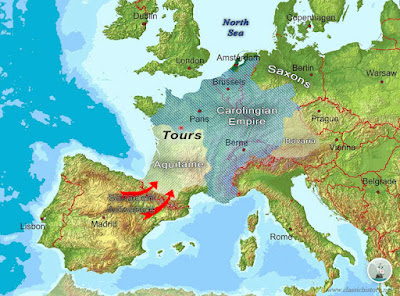For a 731 attempt by the Umayyad Caliphate to cross the Pyrenees and invade Western Europe, al-Rahman was put in charge of the army. This time, the Muslim army made swift progress. Toulouse had been won by surprise, but this time Duke Odo's light infantry faced a Muslim cavalry in open battle. Al-Rahman took Bordeaux and then defeated Odo at the battle of Garonne.
Odo fled northward to Charles Martel, who had declined to help him in 721. Martel had been planning since then, however, and with a financial loan from Pope Gregory II had hired, trained, and equipped a standing army to defend Christendom from the invading Saracens. He marched his people south and set up on a hill south of Tours.
Al-Rahman came upon Martel's army on 10 October 732 and paused. Martel had taken a superior position: high ground, with a wooded area at its foot that would impede the organized progress of the cavalry. After seven days when neither army made an offensive move, al-Rahman finally decided he could not delay. His cavalry charged uphill and broke through the Frankish phalanxes several times. The phalanxes did not scatter, however, and little progress was made by the Muslims.
Al-Rahman was killed in one of the charges, and the remaining officers could not agree on a leader or a new strategy. They were also concerned with the spoils of war they had gathered along the way, and the risk of losing and having their camp plundered motivated them to retreat.
Four years later, al-Rahman's son made another attempt at the request of the Caliph, this time by sea. His fleet landed at Narbonne on the Mediterranean coast, proceeded to Arles on the coast (already under Muslim rule), and then prepared to march north.
Charles Martel was ready. He brought his army south, along with help from King Liutprand of the Lombards. They liberated Avignon, Nîmes, and others. He then drove the Muslims out of Arles and burned the city to the ground to prevent its future use as a Muslim base. Once again, the Muslim invasion of Europe was turned back.
Liutprand of the Lombards was one of the most successful Lombard rulers, and we'll take a closer look at him next time.

